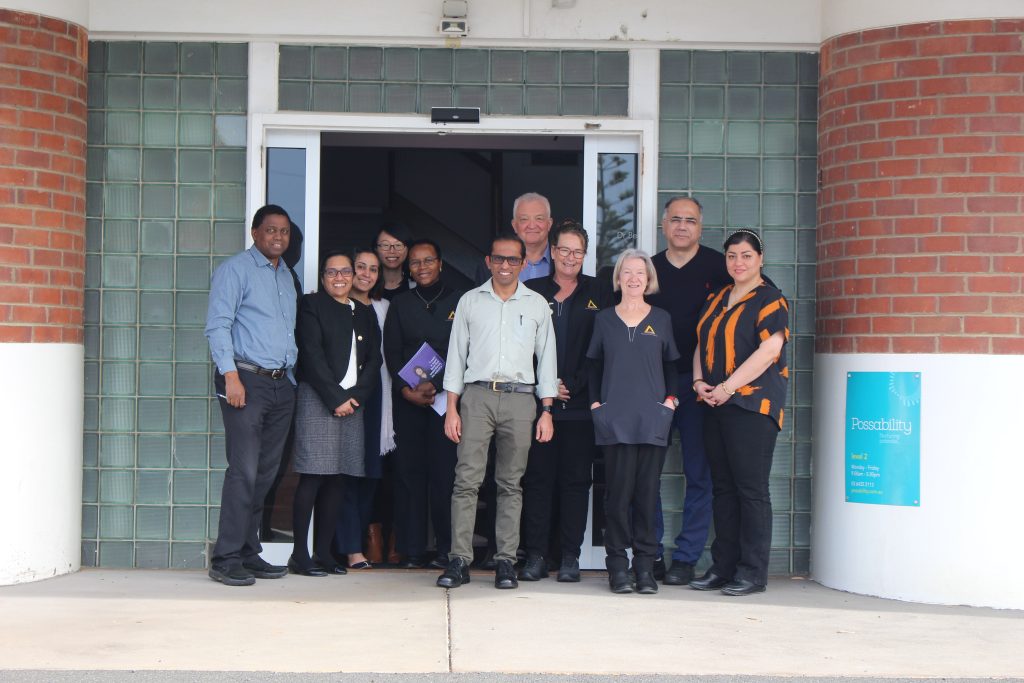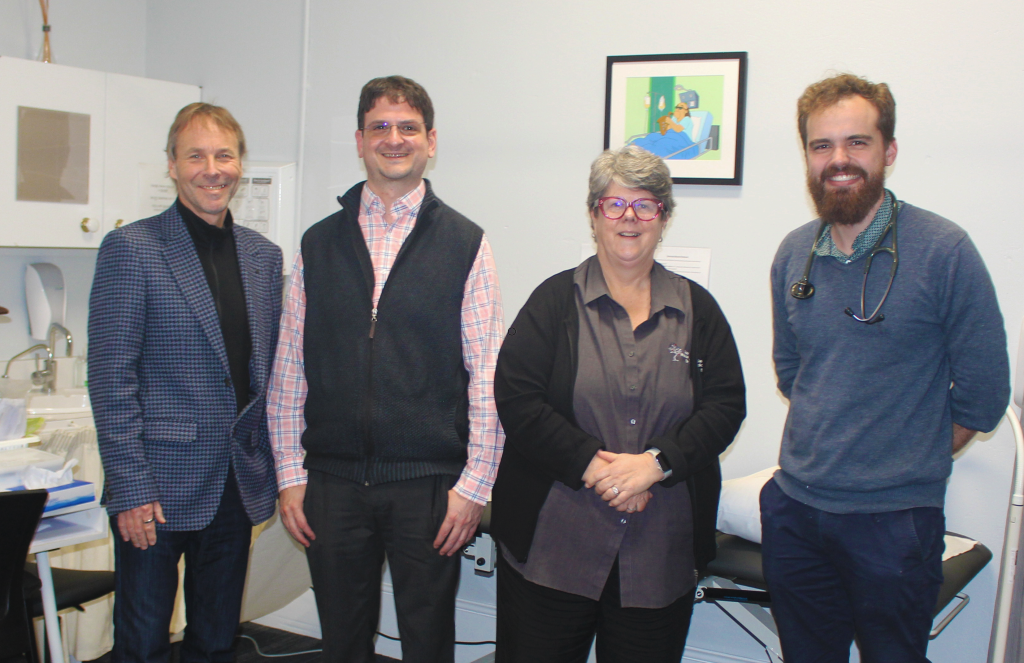Recruiting and retaining GPs through community
Posted on December 19, 2024

How two general practices recruit and retain new GPs by creating a sense of belonging
In the rural and remote areas of north and north-west Tasmania, attracting and retaining GPs has long been a challenge.
Many doctors who start their careers in these regions face significant barriers to staying long term – including professional isolation, limited resources, and personal adjustments.
However, thanks to grants funded by the Australian Government through Primary Health Tasmania, general practices in these areas are beginning to find new ways to address these challenges by fostering a sense of community.
Primary Health Tasmania worked in partnership with local Rural Workforce Agency, HR+, and the Rural Doctors Association of Tasmania to better understand the barriers to accessing GP services in these regions and identify possible solutions.
The general practice recruitment and retention grants program came out of this research.
The funding has been supporting practices to address key issues they have identified through the Australian Workforce Assessment Recruitment and Retention Exercise (AWARE) tool, another product of this collaborative work to improve access to GP services in regional, rural and remote Tasmania (see fact box).
Deloraine Medical Centre
At the Deloraine Medical Centre, practice manager Tanya Barrett explains how difficult it had been to find and keep GPs.
“They would come to our practice for a little while to do their training and then leave. Finding them was also very difficult. So that was our main focus,” Tanya says.
The grant allowed the practice to offer better support including financial incentives such as rental assistance, moving costs, and even a car for new recruits.
They also used the grant funding to create a new, fit-for-purpose website and to create a professional recruitment video, highlighting the beauty of the local area.
The main focus, however, has been on building a sense of community.
The practice has created a welcoming environment for GPs by hosting community events like bonfire nights and barbecues where people can bring their families and swap cultural dishes to help new doctors meet the locals and feel a sense of belonging to their new community.
Dr Aaron Hawkins is a lead GP and practice principal at the Deloraine Medical Centre who is focussed on the potential emotional impact of GPs moving to a regional area.
“I think it’s really hard coming to a new community as a doctor, and for a lot of them, it’s their first job as a doctor. Sometimes they’re moving interstate or from overseas,” he says.
“It’s been great to offer just those little parts on the ground that are welcoming and make that transition much easier. I think it means that they’ve settled in and felt much more comfortable from the start.”
The practice leadership team has done things like help out when a new recruit hit a pothole and burst a tyre on a loaned car burst a loan car tyre, help find accommodation for visiting families, taken them grocery shopping, and shown them around the local gym.
It has also celebrated achievements, such as when doctors have achieved Royal Australian College of General Practitioners fellowship or reached other milestones.
“If we all celebrate our achievements and successes, everyone feels better about themselves and coming to work because you need to be happy at work,” Tanya says.
“It helps people to feel appreciated because then they realise that we appreciate all the effort and study, time and hard work.”
Aaron agrees.
“It feels like a family instead of just a workplace,” he says.
“The patients seem to like it too. They comment on our Facebook page and then the patients feel like they’re part of the celebration too.”
By using the AWARE tool, the practice identified key areas for development, such as better onboarding processes and cultural awareness training.
“We’ve done training in cultural awareness and LGBTQI+ issues, not just for the doctors but for the whole team,” she says. “It’s important that everyone—whether they’re a receptionist or a GP—has the skills and confidence to provide inclusive care.”
Goran Mujkic, practice director, says the grants program has led to benefits not just for the practice, but for the broader community.
“The grant helped the practice grow. Everything’s a lot easier now that we’ve got three more doctors. It’s had a massive impact,” he says.
Goran says word has spread about the practice being a great place to work which is affirming that they made the right decisions.
“I was doing interviews and spoke to one doctor who said, ‘I’d love to come and work with you, because I’ve heard so many good things’.”
Aaron notes the importance of building community to retain GPs.
“Having three more doctors than we did a year ago has completely changed the dynamic,” he says.
“It’s just so important that they feel comfortable in the community. Otherwise, no matter what kind of work we can give them, if they’re not comfortable living here, they’re not going to stay.
“It’s key for us to make that initial, hardest bit as easy as possible.”

Southside Family Medical (Burnie)
Southside Family Medical in Burnie is another regional practice that benefited from the grants program and is now passing that benefit along to its community.
The practice used its grant to recruit two GPs from overseas and support them to arrive and settle in, in addition to assisting four other GPs who have been with the practice since 2020 and 2021. They have all felt supported in making Burnie their home says practice manager Senzeni Bulle.
“We knew that when the two recently recruited GPs arrived, when they did a conversion of their local currencies, it almost didn’t do anything,” she says.
“But just knowing that they have that initial rent, fuel and maintenance of their vehicles went a long way. We also paid for social outings with Rotary and Rotary fellowship meetings, helping them to feel part of the wider Burnie community.”
Senzeni says the practice is more than just a place of work; it’s a network of health professionals who support each other.
“We say we are really a family in a way,” she says. “We also let the staff know it’s like a family, whether it’s personal or it’s work, we can always talk, with professional boundaries of course. It’s nice just knowing that you can get a shoulder anytime.
“We had one doctor, who worked all throughout her pregnancy, and we just had to say, ‘we encourage you to take some time off with your new baby’, and used grant funding to support maternity services for her.”
Administrative and support staff at Southside play an integral role in the practice. As most of the GPs were born and educated outside of Australia, they are navigating a new and complicated healthcare system and, at times, cultural and language differences.
The GPs rely on the Principal GP, Dr Themba Bulle, the admin and reception staff to provide links with the community, and to assist with queries such as billing and correspondence. Nursing staff equally lend a hand on the clinical front and patient care. According to Senzeni, it was
Rachel Ditcham, in charge of the reception team, explains the reception staff provide a variety of support to doctors coming from overseas.
“Often a doctor will come and ask what certain lingo means, when they first arrive,” she says. “Or how to pronounce different names. Over time they improve quite a bit.
“We help them in that way so they can focus on patient care.”
For Dr Dilani Wijessooriya, a GP originally from Sri Lanka, the grant contribution was a way to recognise the financial strain she experienced when going through the fellowship study and exam process.
“Especially for international medical graduates (IMGs), at the beginning, it’s really hard because we are coming from all different places and starting a home afresh,” she says.“Doctors are coming here directly from other countries, and may not have any pay when trying to settle in. They may have at least one month of observership, trying to understand the booking and billing systems for example. It’s all totally new for them, and setting up with no pay, being independent contractors.
“I arrived in Australia in 2019, but due to various issues, I wasn’t able to start practising until 2020. Before that and for 13 months, I sat with Doctor Bulle observing him and learning, but with no income.”
Dilani says that this time was difficult for their family, with four people being supported by one income, that of her husband. Given all the expenses of moving to a new country, the grant contribution went a long way in helping them set up their new lives.
“If I didn’t get the grant at that time, we might have had to wait another six months after moving house to think about furniture.
“Most practices run with international medical graduates in Tasmania, and most of them came at a similar time to me, so they may have similar stories.
“It’s not only that we’re working – we need to complete our professional development studies, and then seek permanent residency. You wouldn’t believe the cost of all of this.
“Everyone appreciated the grant and we will always be grateful for it.”
This story features in Issue 19 of our Primary Health Matters magazine. Click here to read the rest of the issue.
